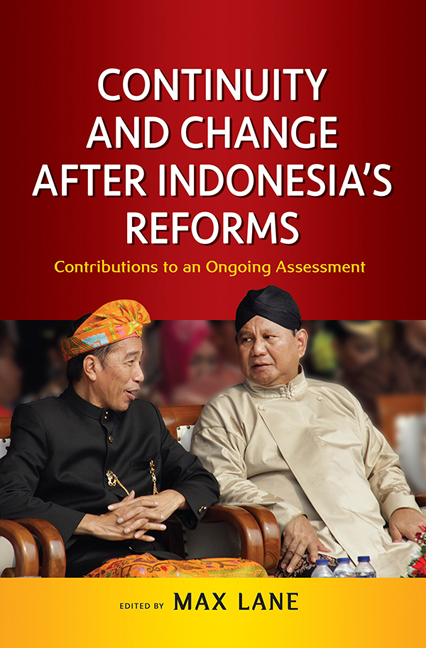Book contents
- Frontmatter
- Contents
- Preface
- About the Contributors
- 1 Indonesia's New Politics: Transaction Without Contestation
- 2 Indonesian Parties Twenty Years On: Personalism and Professionalization amidst Dealignment
- 3 Ideologies of Joko Widodo and Indonesian Political Parties
- 4 Political Islam Movements and Democracy in Indonesia: A Changing Landscape?
- 5 Creating Leadership Legitimacy in Post-Reform Indonesia
- 6 The Political Middle Class in Post-Soeharto Era Indonesia
- 7 The Politics of Centre–Local Relations in Contemporary Indonesia
- 8 The Roots and Actors of Corruption in the Political Realm
- 9 Why Is It Really Hard to Move On? Explaining Indonesia's Limited Foreign Policy Reform After Soeharto
- 10 Papua under the Joko Widodo Presidency
- 11 Youth “Alienation” and New Radical Politics: Shifting Trajectories in Youth Activism
- Index
9 - Why Is It Really Hard to Move On? Explaining Indonesia's Limited Foreign Policy Reform After Soeharto
Published online by Cambridge University Press: 06 September 2019
- Frontmatter
- Contents
- Preface
- About the Contributors
- 1 Indonesia's New Politics: Transaction Without Contestation
- 2 Indonesian Parties Twenty Years On: Personalism and Professionalization amidst Dealignment
- 3 Ideologies of Joko Widodo and Indonesian Political Parties
- 4 Political Islam Movements and Democracy in Indonesia: A Changing Landscape?
- 5 Creating Leadership Legitimacy in Post-Reform Indonesia
- 6 The Political Middle Class in Post-Soeharto Era Indonesia
- 7 The Politics of Centre–Local Relations in Contemporary Indonesia
- 8 The Roots and Actors of Corruption in the Political Realm
- 9 Why Is It Really Hard to Move On? Explaining Indonesia's Limited Foreign Policy Reform After Soeharto
- 10 Papua under the Joko Widodo Presidency
- 11 Youth “Alienation” and New Radical Politics: Shifting Trajectories in Youth Activism
- Index
Summary
Introduction
The aim of this chapter is to explain the absence of fundamental change in Indonesia's foreign policy after the New Order. Most discussion of reformasi in Indonesia is largely dominated by national or local politics, with some limited accounts on Indonesia's foreign policy and changing international profile. Most of these accounts have been widely influenced by theories of “democratic transition” that put emphasis on democratization of foreign policy-making processes. According to these theories, the democratization process has driven foreign policy change in Indonesia since the fall of Soeharto in 1998. Another strand of argument takes into account the role of “international pressure” relating to human rights and East Timorese independence as the causes of Indonesia's foreign policy change after reformasi. Taking a slightly different angle, Laksmana (2011a) argues that reformasi has created Indonesia's different international profile to cope with a changing geopolitical and geostrategic landscape.
In this chapter, I shall propose a rival argument, that Indonesia's foreign policy after reformasi does not fully embrace broader ideational, political, and institutional transformations. Whilst the existing arguments are correct in arguing that there are some institutional changes in Indonesia's foreign policy-making, which were caused by democratization, the reform is only limited and partial. Current analyses are flawed in three senses. First, they are too narrow in understanding Indonesia's foreign policy only in terms of institutional dynamics or policy-making process. Less has been said about ideational foundations of Indonesia's foreign policy, as well as its political and ideological underpinning in the changing context of Indonesian domestic politics. Second, given the neglect of the ideational foundation, they also fail to explain the broader paradigm shift in Indonesia's foreign policy, in which the bureaucratic institutions are taken for granted as the main actor in foreign policy. Third, this literature also neglects contestation between “social forces” in the process of foreign policy-making.
These weaknesses necessitate rethinking Indonesia's foreign policy after reformasi. In contrast to the democratic transition literature, I argue that Indonesia's foreign policy has undergone only “limited reform”. Three important factors persist in post-New Order foreign policy: (1) the “dual” capitalist-developmental and security-oriented doctrine; (2) bureaucratic elitism in decision-making; and (3) the preserved legacy of Cold War alignment in international politics, particularly at the regional level.
- Type
- Chapter
- Information
- Continuity and Change after Indonesia's ReformsContributions to an Ongoing Assessment, pp. 195 - 212Publisher: ISEAS–Yusof Ishak InstitutePrint publication year: 2019

